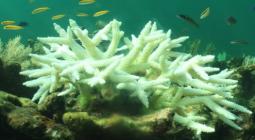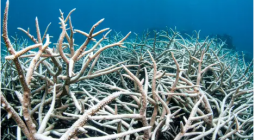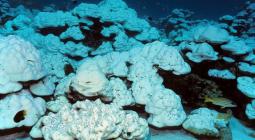Lord Howe island faces ‘major’ coral bleaching as ocean temperatures continue to break records
Exclusive: Fears coral bleaching moving south to Lord Howe, Norfolk islands after southern Great Barrier Reef experiences worst heat stress since 1985
Scientists fear excessive ocean heat – which is bleaching corals in parts of the Great Barrier Reef – is now hitting the world’s most southern coral reef at the world heritage-listed Lord Howe island.
There are also concerns ocean temperatures are reaching dangerous levels for corals at Australia’s remote Norfolk Island, which is about 1400km east of Queensland’s Gold Coast.
One scientist said Lord Howe and Norfolk had many corals that had yet to be described by science.
Scientists monitoring reefs at Lord Howe, about 600km east of Port Macquarie on the central coast of New South Wales, have recently recorded a dramatic jump in the numbers of corals either bleached or turning pale.
Prof Bill Leggat, a coral scientist at the University of Newcastle who is helping co-ordinate long-term monitoring of corals at Lord Howe, said that over the past two weeks “the thermal stress has really ramped up and we are seeing bleaching coming on quite quickly”.
“We are seeing pretty much all the susceptible corals bleaching or paling all across the bay. It was quite confronting. This is the start of a major and quite severe bleaching event.”
Corals bleach if they are exposed to abnormally warm water for long periods. Some coral species are more resistant to bleaching than others, but severe bleaching can kill the animal. Experts say corals that “recover” are more susceptible to disease and don’t reproduce as well in following years.
The bleaching comes as global ocean temperatures continue to break heat records and follows a major bleaching outbreak at reefs across the Americas during the most recent northern hemisphere summer.
The Great Barrier Reef Marine Park Authority is preparing to carry out extensive aerial surveys of the world’s biggest coral reef after confirming extensive coral bleaching last week in the park’s southern section.
Data from the US government’s Coral Reef Watch shows the amount of heat stress accumulating on corals in the southern Great Barrier Reef is now the highest since its records began in 1985.
The authority has said some mild to moderate bleaching has been seen in all areas of the reef, but it will wait until full aerial surveys and further in-water monitoring are completed before assessing how severe the event is.
Lord Howe island’s corals stretch for about 4km across a bay on the island’s west. Leggat said there had been two recorded bleaching events in 2010 and 2019.
Coral Reef Watch data showed the level of heat stress accumulated on the corals so far this year had surpassed those seen in the 2019 event and were climbing towards the highest ever recorded in 2010.
“What’s scary is it’s already hot and there are predictions for another few weeks [of warm conditions]. It could exceed the 2010 event. That thermal stress will continue and it will only get worse.
“This is a really well managed reef system, but that is being overwhelmed by climate change. It’s really scary. We have this beautiful system isolated from other stressors, and it’s being hammered by coral bleaching.”
At Norfolk Island, Coral Reef Watch data shows heat stress has already surpassed the only previously recorded bleaching event in 2020.
The year 2010 saw higher levels of heat stress but Prof Tracy Ainsworth, a coral scientist at the University of New South Wales who is helping monitor corals at Norfolk island, said that event was not monitored by scientists.
“It’s going the way of 2020 again and we’re on track in the coming weeks to see bleaching,” she said.
“What’s concerning is that it could be a full month of continued heat stress and we could be looking at the most severe event for that reef.”
Prof Andrew Baird, a coral scientist at James Cook University, has been studying the corals at Lord Howe and Norfolk and estimates between 20% and 50% are still not formally described.
“If Lord Howe or Norfolk get badly bleached there will be species that disappear before we get a chance to describe them,” he said.
Cover photo: Scientists have described the thermal stress on the coral reefs around the world heritage-listed Lord Howe as ‘confronting’. Photograph: Patrick Keneally/The Guardian





